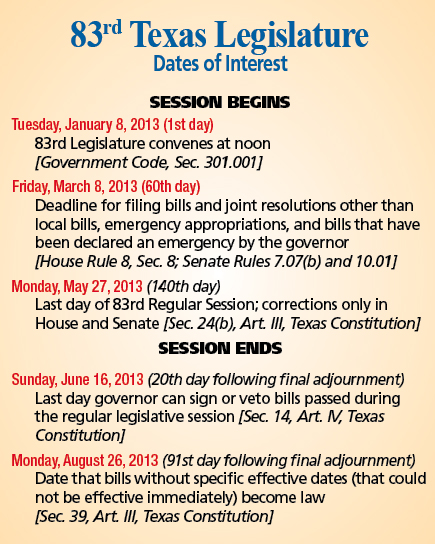 The County Judges and Commissioners Association of Texas (CJCAT) has always approached the Texas Legislature with resolve. For example, during the past few legislative sessions local government officials and associations such as the CJCAT voiced spirited opposition to appraisal and revenue caps and extreme budget cuts. Consequently, multiple regular and special sessions adjourned without imposing these restrictions and cuts, due in large part to the heightened presence and significant voice of county officials and their supporters. Lawmakers will be asked to consider thousands of bills throughout the 83rd Session, and the CJCAT will closely monitor all proceedings to champion and protect county government. Officers and members of the CJCAT will accompany CJCAT General Counsel Jim Allison in Austin during the session to provide needed testimony and present a united front.
The County Judges and Commissioners Association of Texas (CJCAT) has always approached the Texas Legislature with resolve. For example, during the past few legislative sessions local government officials and associations such as the CJCAT voiced spirited opposition to appraisal and revenue caps and extreme budget cuts. Consequently, multiple regular and special sessions adjourned without imposing these restrictions and cuts, due in large part to the heightened presence and significant voice of county officials and their supporters. Lawmakers will be asked to consider thousands of bills throughout the 83rd Session, and the CJCAT will closely monitor all proceedings to champion and protect county government. Officers and members of the CJCAT will accompany CJCAT General Counsel Jim Allison in Austin during the session to provide needed testimony and present a united front.
“We are going to spend most of our time making sure that the Legislature does not solve the state’s budget deficit by shifting responsibility and cost down to the counties,” said CJCAT Legislative Committee Chairman and Polk County Judge John Thompson. “All county officials should start now and stay close to their state elected officials and make sure they know where we stand.”
From indigent defense and indigent health care to inmate transfers and elections, costs continue to be pushed down to the local level, said CJCAT Immediate Past President and Hays County Commissioner Debbie Gonzales Ingalsbe.
“We need to foster a better understanding among public officials, in all levels of government, as to how these costs can impair a county’s ability to provide essential services to our public,” Ingalsbe maintained.
This resolve to connect with state officials is especially important considering the high turnover of lawmakers following the November 2012 elections. Approximately one third of the 83rd Texas Legislature is comprised of members who are new to either the House of Representatives or the Senate.
“In addition to the traditional issues, such as unfunded mandates, we will exert a major effort to restore funding to our dedicated accounts, like the 9-1-1 infrastructure fund,” Allison indicated. “For too many years the Legislature has balanced the state budget by using funds from these dedicated accounts. Truth in taxation should require that these funds be used for the purposes promised to the voters.” In fact, at its State Association conference in October 2012, the CJCAT membership passed a resolution focusing on this issue as follows:
Opposition to Diversion of Dedicated Funds
WHEREAS, the Legislature has committed certain funds for dedicated purposes; and
WHEREAS, unfortunately these funds have been improperly withheld from these needed functions and used to balance the general state budget; and
WHEREAS, the state leadership has proposed to end this diversion of funds;
NOW, THEREFORE, BE IT RESOLVED that the County Judges and Commissioners Association of Texas expresses its opposition to any state diversion of dedicated funds and supports the state leadership’s commitment to end this practice.
Other resolutions spotlight important issues cited by officials as critical to the effective functioning of county government, such as caps and transportation funding.
“As always we will need to be vigilant concerning taxing authority,” emphasized Oldham County Judge Don R. Allred, a past president of the CJCAT. “Issues such as tax caps, revenue caps, as well as the state passing down costs to local government because of the budget crunch, will be at the forefront.”
Allred also cited road damage caused by increased weights and the number of trucks using county roads.
“This is an issue that is statewide and broadening each year,” Allred stressed.
Water is another heightened concern, with regard to shortage and usage including both groundwater and surface water.
“We also need some type of regulatory authority at the county level to deal with urban sprawl, as growth continues to creep into the unincorporated areas of the state,” Allred stated.
The best way to highlight these critical concerns is to become engaged in the legislative process.
“We become engaged by making our voices heard, engaged by informing our leaders of needed action, engaged by offering alternative legislation that is more just, and engaged by following throughout the process to ensure the outcome,” Allred recited.
Make phone calls, send e-mails, and meet with lawmakers in person, Ingalsbe urged, and “communicate our message.”
For up-to-date information on legislative positions and progress, judges and commissioners can monitor the Association website, www.cjcat.org. For more immediate updates, officials may submit their e-mail addresses to cjca@allison-bass.com.
– By Julie Anderson















